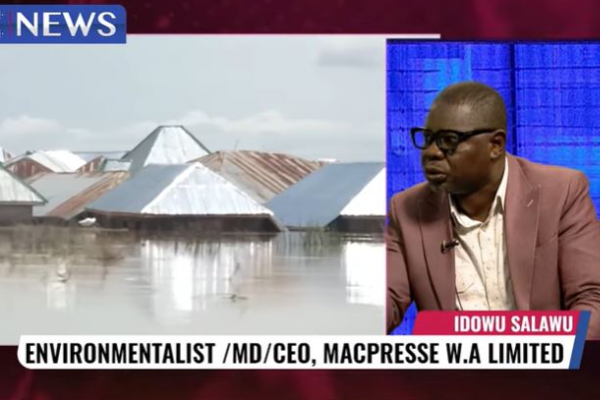Perennial flooding is one of Nigeria’s most common natural disasters.
Annual flooding is becoming more common in some states during the rainy season.
Annual flooding is becoming more common in some states during this rainy season which has been linked to climate change.
Unlike some natural disasters, human induced flooding can be controlled with proper planning and provision of necessary infrastructure.
Flooding in Nigeria is primarily caused by humans, with poor urban planning practices and inadequate environmental infrastructure playing a role.
The extent and nature of Nigeria’s flooding are such that the actual figures for displacements, losses and fatalities cannot be truly ascertained due to poor records and reporting.
[wonderplugin_video iframe=”https://youtu.be/Oc9j9Kt1JWg” lightbox=0 lightboxsize=1 lightboxwidth=960 lightboxheight=540 autoopen=0 autoopendelay=0 autoclose=0 lightboxtitle=”” lightboxgroup=”” lightboxshownavigation=0 showimage=”” lightboxoptions=”” videowidth=600 videoheight=400 keepaspectratio=1 autoplay=0 loop=0 videocss=”position:relative;display:block;background-color:#000;overflow:hidden;max-width:100%;margin:0 auto;” playbutton=”https://www.tvcnews.tv/wp-content/plugins/wonderplugin-video-embed/engine/playvideo-64-64-0.png”]
Flooding endangers sustainability because it harms the economy, health, social life, and environment. It jeopardises Nigeria’s ability to meet global sustainable development goals.
But while the rains maybe a blessing to some farmers, for others, has become Dreadful due to the destructive impact it has on lives and property.
Environmentalist and MD/CEO At Macpresse W.A Limited, Idowu Salawu speaking on the issue of flooding in Nigeria on Thursday’s edition of TVC Breakfast with Sam Omatseye and Mike Okwoche noted that what we used to experience was natural but what we are currently having are human induced factor.
Mr. Salawu says that the current floods caused by human activity raises the possibility that the SDG target for 2023 may not be met because several indicators are currently being impacted.
He pointed out that as water settles, farmlands would be impacted, which will have an effect on people’s health as their water supply will be contaminated.
As a result of the destruction of the infrastructure, schoolchildren would also be impacted.
“At this point, we’d be talking about how to resettle the people in the area and provide a relief package for them, and then we can start planning for 2023 so that we don’t have this kind of devastating effect.”
“People living at the river bank should relocate because it would be disastrous if they remain.
“Everyone is aware that moving or settling is difficult, but the reality on the ground should not be taken for granted.
“Governments must begin developing relief initiatives and locations for relocation that are part of mitigation strategies throughout Nigeria for this reason.
“Environmental infrastructure facility should be one of the Paramount thing we need to do, climate change is real.
“Nigeria is not immune from flooding, but we must know what to do to reduce the impact of flooding.
Mr Salwau noted that for lands that are being reclaimed, there are usually side effects as other areas will be impacted. For that not to happen, the environmentalist said adequate planning needs to be done.
People who are aware of the impact of urban, coastal, and river flooding must also be involved.
He noted that if coastlines are developed, there will be improvements in tourism instead of leaving it for Coastal
evolution.
“Even if we are experiencing a crisis, we may use it as an opportunity.
Further, Mr. Salwau stated that every branch of the government will be responsible for developing a mitigation strategy to address the flodding issue.
The impact of this problem, he continued, might not be completely eliminated, but it can be lessened.
“State governments should make it a priority to involve the ecological office, New MAP, which is being developed at the state level, in their environmental project.
States, the federal government, and local governments should synergise to develop a comprehensive plan to build environmental infrastructure facilities and infrastructure facilities that will lessen the effects of flooding on the populace.
Global targets for attaining environmental and human development by 2030 are known as the sustainable development objectives. Nine of the 17 development objectives have a direct impact on flooding. These include supplying access to clean water and sanitary facilities, as well as eliminating hunger and poverty.
In the case of Nigeria, flooding has had a major impact on the country’s development goals in relation to the social, economic and environmental targets.













